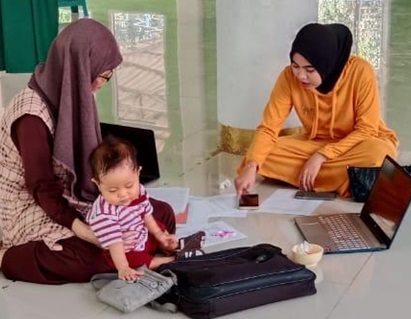Peningkatan Efisiensi Monitoring Status Gizi Anak melalui Pembangunan dan Pendampingan Penggunaan Sistem Informasi untuk Kader Posyandu Increasing the Efficiency of Monitoring Children's Nutritional Status through Development and Assistance in the Use of Information Systems for Posyandu Cadres
Main Article Content
Abstract
Posyandu volunteers (cadre) have an essential role in the early detection of stunting in children under two years, achieved through routine weighing and monitoring of children's growth. This community service activity helps Posyandu volunteers in their role of recording and reporting. Posyandu volunteers use the SIP Book (Posyandu Information System) to record and report the results of activities at Posyandu and monitor maternal and child health, including children's nutritional status. Manually recording the nutritional status of children registered in Posyandu by the volunteers creates time inefficiencies in organizing the Posyandu. For this reason, an information system was built to precisely meet the needs of Posyandu volunteers in their role to monitor stunting in their work area. This information system is website-based and manages nutritional status data for toddlers at Posyandu. This system was tested on Posyandu volunteers in Nisombalia village, Maros Regency, South Sulawesi. Evaluation through questionnaire shows an improvement (from bad to very good) in terms of ease of recording and monitoring the nutritional status of children registered with Posyandu.
Downloads
Article Details

This work is licensed under a Creative Commons Attribution-ShareAlike 4.0 International License.
Authors who publish with this journal agree to the following terms:
- Any article on the copyright is retained by the author(s).
- Author grant the journal, right of first publication with the work simultaneously licensed under a Creative Commons Attribution License that allows others to share work with acknowledgment of the work authors and initial publications in this journal.
- Authors are able to enter into a separate, additional contractual arrangements for non-exclusive distribution of published articles of work (eg, post-institutional repository) or publish it in a book, with acknowledgment of its initial publication in this journal.
- Authors are permitted and encouraged to post their work online (e.g., in institutional repositories or on their websites) prior to and during the submission process, as can lead to productive exchanges, as well as earlier and greater citation of published work.
- The article and any associated published material is distributed under the Creative Commons Attribution-ShareAlike 4.0 International License
References
Abu Khoiri. (2008). Pengembangan Sistem Informasi Posyandu Guna Mendukung Surveilans Kesehatan Ibu & Anak Berbasis Masyarakat Pada Desa Siaga (Studi Kasus Di Kelurahan Manisrejo Kecamatan Taman Kota Madiun Provinsi Jawa Timur). Repository UNDIP
Group, W. H. O. M. G. R. S., & de Onis, M. (2006). WHO Child Growth Standards based on length/height, weight and age. Acta Paediatrica, 95, 76–85. https://doi.org/10.1111/j.1651-2227.2006.tb02378.x
Kementerian Kesehatan Indonesia. (2016). Pedoman Umum Pengelolaan Posyandu. Kementerian Kesehatan Republik Indonesia.
Kementerian Kesehatan Republik Indonesia. (2012). Kurikulum dan Modul Pelatihan Kader Posyandu.
Noprida, D., Polapa, D., Imroatun, T., Agustia, W., Sutini, T., Heny Purwati, N., Apriliawati, A., Ilmu Keperawatan, F., & Studi Magister Keperawatan Peminatan Keperawatan Anak, P. (2022). Pengaruh Pelatihan Kader Posyandu Terhadap Peningkatan Pengetahuan Tentang Skrining Pertumbuhan dan Perkembangan Balita dengan KPSP Wilayah Pasar Rebo. Jurnal Pengabdian Masyarakat Saga Komunitas 1(2)https://doi.org/10.53801/jpmsk.v1i02.22
Pratama, S. (2016). Penerapan Sistem Informasi Posyandu Mawar Kelurahan Simpang Empat. Technologia: Jurnal Ilmiah, 7(4). http://dx.doi.org/10.31602/tji.v7i4.658
Ramadhan, K., Maradindo, Y. E., Nurfatimah, N., & Hafid, F. (2021a). Kuliah kader sebagai upaya meningkatkan pengetahuan kader posyandu dalam pencegahan stunting. JMM (Jurnal Masyarakat Mandiri), 5(4), 1751–1759. https://doi.org/10.31764/jmm.v5i4.5091
Sholihah, N., & Kusumadewi, S. (2015). Sistem informasi posyandu kesehatan ibu dan anak. Prosiding SNATIF, 207–214.
Susanti, W. I., Widodo, A. P., & Nugraheni, S. A. (2019). Pengembangan Sistem Informasi Pencatatan dan Pelaporan Status Gizi Balita Stunting di Kelurahan Gajah Mungkur. Jurnal Manajemen Kesehatan Indonesia, 7(1), 67–74, https://doi.org/10.14710/jmki.7.1.2019.67-74
Hafifah, N., & Abidin, Z. 2020. Peran Posyandu dalam Meningkatkan Kualitas Kesehatan Ibu dan Anak di Desa Sukawening, Kabupaten Bogor. Jurnal Pusta Informasi Masyarakat 2(5) 893-900.
